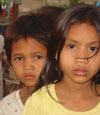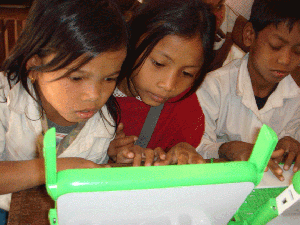OLPC Cambodia
| Country Information | |
| ISO Country Code | KH |
| Wikipedia Article | Wikipedia Link |
| Government Support | Low and not OLPC Priority |
| Deployment | Demonstration (under 50 machines) |
| Languages | |
| Keyboard Layout | OLPC Khmer Keyboard |
| Written | Khmer (kh) |
| Spoken | Khmer (kh) |
| Secondary Written | English (en) |
| Secondary Spoken | English (en) |
Bienvenue-Welcome
... and thank you for visiting the Cambodia "OLPC" related Wiki-Pages, for the One Laptop Per Child Universal Primary Education project. This is an Open Community project, similar to the Wikipedia and Open Source Community projects, like Linux, OpenOffice, etc. and it is working along Agenda 21 and Millennium Development Goal nr.2: Bringing Universal Primary Education. To edit text on this page or add pages, log in and and "edit page / save page" button will appear.
- 2' video - OLPC Intro part 1
- 2' video - OLPC Intro part 2
The aim of this educational project is to bring Universal Primary Education by 2015 as per - anno year 2000 initiated - United Nations Millennium Development Goal nr.2. For this and above approach, - and also a lot of lobbying by the right persons on the right places and time - the United Nations is a Partner in this Open Community project! It is the largest educational project undertaken by Humanity ever... and deemed by many as one of the most inspiring projects out there ... and things are moving very fast indeed: over 86.000 eBooks available, all education disciplines covered, 2008 saw the first 3 developing countries with full coverage, i.e. with all kids age 5 to 12 equipped with these smallest schools in a box-laptops.
In many respects, OLPC was born in Cambodia. Nicholas and Elaine Negroponte started a school - The Elaine and Nicholas Negroponte School - in 2000 as part of an effort by Bernie Krisher to reach out to children in rural Cambodia. They brought laptop computers to the school as part of their efforts to bring opportunities for learning. The program was so successful that Nicholas was inspired to try to do the same for every child.
In February 2008, 520 donated XO laptops from the Give One Get One program arrived in Cambodia. This shipment was distributed to a wide-range of government schools and educational NGOs. 390 machines were donated to primary schools in remote rural villages where there is no electricity and very little educational opportunities for the local children. The remaining 130 machines went to both urban and rural schools, orphanages and educational centers for children.
List of these schools:
- haven't been abie to find out where these schools are, so please list them if you know with an url from google maps
- The XO machines are used in Computer Class at Tchey School, in Tchey Village outside of Siem Reap, Cambodia. The school is powered by solar energy.
- The Elaine and Nicholas Negroponte School I found a video report on one of the schools, i.e. the The Elaine and Nicholas Negroponte School where they started with non-XO laptops before they even existed and later the school also received XO's.
Educators in Cambodia see the potential for the XO laptops to assist in creating stimulating learning environments for rural children. This may be the catalyst for rural communities to begin to build a positive approach to learning, something that has been neglected throughout decades of civil war, isolation and poverty.
Thank you to all those in North America who participated in the Give1 Get 1 initiative, and thank you to OLPC!
A Cambodian language localization of the XO software has been started.
| Primary Language | ,|x|Language spoken::x}} |
| Number of Laptops | Number of manufactured laptops::1000 |
| Keyboard Layout | Keyboard::OLPC Khmer Keyboard |
| Build | ,|x|Software release::x}} |
| Date(s) Arrived in Country | ,|x|Has received laptops on date::x}} |
| School Server | ,|x|School server status::x}} |
| Deployment Status | Deployment status::Exact deployment date not set yet. 1000 of 3200 laptops have already been deployed to schools, however. |

